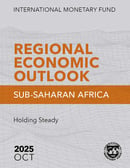This web page presents information about the work of the IMF in Uganda, including the activities of the IMF Resident Representative Office. Additional information can be found on the Uganda and IMF country page, including IMF reports and Executive Board documents that deal with Uganda.
At a Glance
- Current IMF membership: 191 countries
- Uganda joined the Fund on September 27, 1963.
- Quota: SDR 361 million
- Outstanding Purchases and loans (SDR): 992.75 million (June 30, 2024)
- The last Article IV Executive Board Consultation was on September 11, 2024 (Country Report 19/125).
- The Fund has maintained a resident representative in Uganda since July 1982.
Office Activities
Interview with Resident Representative Mr. Walker and journalist Mr. Oketch.
Daily Monitor Interview: IMF: Tame Appetite for Borrowing
December 17, 2024
Uganda hosted one of its favorite foreign visitors.
Dr. Jane Goodall, the world’s most venerated primatologist and anthropologist, author of 16 books and 11 children’s books, honored us with her presence in Kampala during which she held a public lecture and joined dignitaries in the celebration of the 25th anniversary of her chimpanzee sanctuary.
August 21, 2023
Memorial Lecture in Honor of the Late Professor Emmanuel Tumusiime-Mutebile
by Abebe Aemro Selassie, Director, IMF African Department
January 27, 2023
Business Perspective TV Interview with Resident Representative, Izabela Karpowicz.
December 5, 2022
Interview with resident representative, Izabela Karpowicz, on REO messages to Uganda.
November 29, 2022
New Vision Press article on October 2022 SSA REO
Interview with resident representative, Izabela Karpowicz, on the latest REO.
November 25, 2022
Fraudulent Scam Emails Using the Name of the IMF
For more information please see Fraudulent Scam Emails Using the Name of the IMF
Uganda and the IMF
No results found. Either there was an error with the web service or there is no data returned by the web service.
Regional Economic Outlook
October 16, 2025

The outlook for Sub-Saharan Africa is showing resilience, despite a challenging external environment with uneven prospects in commodity prices, still tight borrowing conditions, and a deterioration of the global trade and aid landscape.
Read the Report
Departmental Papers on Africa
 The Departmental African Paper Series covers research on sub-Saharan Africa conducted by International Monetary Fund (IMF) staff, particularly on issues of broad regional or cross-country interest. The views expressed in these papers are those of the author(s) and do not necessarily represent the views of the IMF, its Executive Board, or IMF Management.
The Departmental African Paper Series covers research on sub-Saharan Africa conducted by International Monetary Fund (IMF) staff, particularly on issues of broad regional or cross-country interest. The views expressed in these papers are those of the author(s) and do not necessarily represent the views of the IMF, its Executive Board, or IMF Management.



